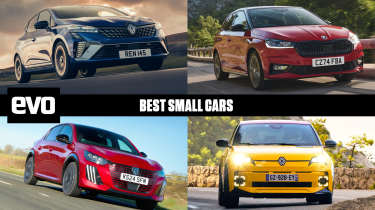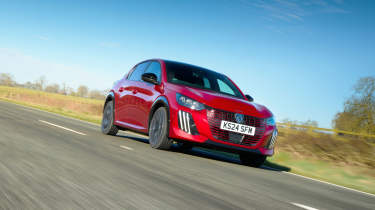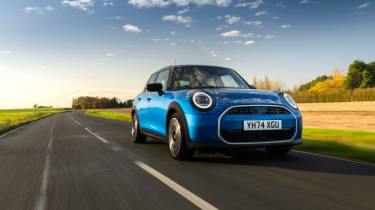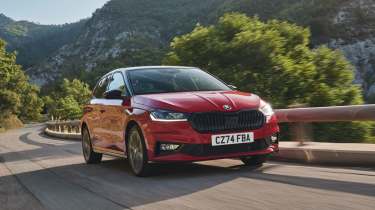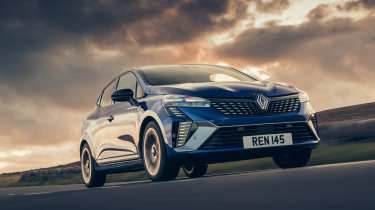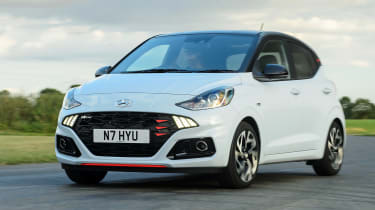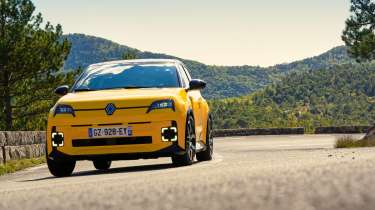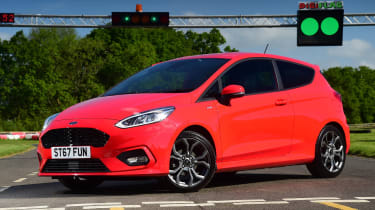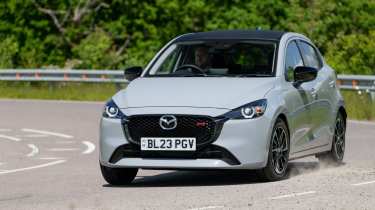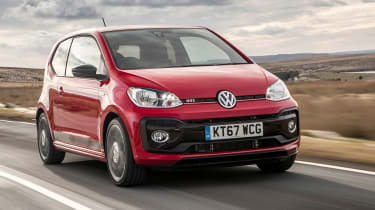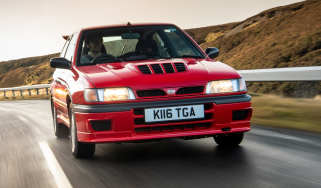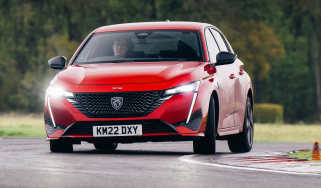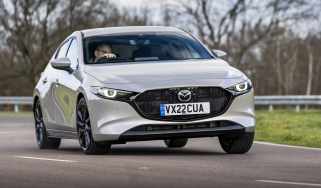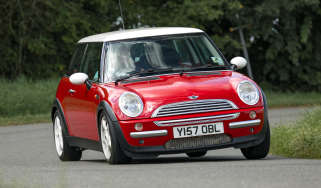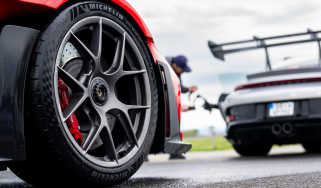Best small cars 2025 – new and used stars for basic affordable fun motoring
New small cars are dying out, so shortlisting the best of the breed means looking to the used market too
The assumption that small affordable cars are not very ‘evo’ is an inaccurate one. For as long as we’ve been around, small cars have been delivering some of the best fun that it’s possible to have on the road. They’re small, light, biddable and most importantly, where we all first start to hone our understanding of car control.
Everything from first exploring what body roll feels like, to full-on lift-off oversteer, is available in bite-sized cliff-noted chunks in a small car. And all the fun in the motoring world can be indulged in behind the wheel, save for gratuitous rear-driven power oversteer, the joy of a naturally-aspirated multi-cylinder engine, or the narcissistic thrill of being watched as you send a supercar’s butterfly door skyward. The basics of the Thrill of Driving are never far away in the cars that are the most accessible to most people.
Which makes it a crying shame that in a world where manufacturer profit margins continue to thin out, the herd of small, cheap, simple cars has never been thinner. To the point that, on top of recounting what good new small cars you can buy now, we’re going to have to make the numbers up with some great used options too. With the passing of the Ford Fiesta, the genre has arguably lost its backbone. While the loss of the Skoda Citigo/VW Up/Seat Mii triplets was a big blow for tiny lightweight runarounds.
The options for a new small car are still excellent, mind, with even an electric contender finally sneaking into the mix as an option we can genuinely recommend… if it fits into your life. So without further delay, below are the best small cars to buy right now, from the new Renault 5, to the Skoda Fabia Monte Carlo, with a mention in deference to the dearly departed Fiesta as a matter of course.
Peugeot 208 GT Line
Priced from £24,155
Pros – lightweight, manual option, looks great
Cons – Slightly rubbery shift, there’s no GTi (yet)
Built on the same PSA-built platform you'll find in the latest Vauxhall Corsa, current Peugeot 208 was a marked step up from its predecessor. It’s endured too, as one of the best small car offerings on the market today. Buckets of technology, an all-electric variant and a design that’s recently been refreshed help it stand out in today’s market.
Featuring the marque’s trademark ‘claw’ daytime running lights and bold, contrasting arches, the exterior design is something you’ll struggle to miss. A charming two-tone design and an aggressive front end make it one of the most attractive small cars on sale. Inside, there’s a pleasingly compact steering wheel, a unique three-dimensional digital dashboard and reams of niceties such as USB-C front and rear, Apple CarPlay, heated seats and more should you opt for the GT Line.
> Peugeot 208 2025 review – a fine alternative to the Ford Fiesta
Most excitingly, the rumour mill has it that the GTi could finally be making a return to the 208 range, possibly before the end of the year. That speaks a great deal of Peugeot’s belief in this little car. There’s a lot of life left in it yet.
Across the range as it stands, powertrain options are reasonable. We’d stick to the bottom of the range (believe it or not) as the 1.2-litre, 100bhp petrol is the only engine available with a six-speed manual. It’s also far lighter than the hybrid and electric versions. The mild-hybrid has an identical 100bhp, albeit only available with a six-speed automatic gearbox, as is the 134bhp model. The all-electric e208 lineup starts with an identical 134bhp, with a 154bhp version leading the e-208 range, albeit at a sturdy £32k.
Mini Cooper
Prices from £25,265
Pros – Premium feel, fun drive, cutesy looks
Cons – no more manual, Minis are now quite large
The regular Mini Cooper has always been a sweet spot in the Mini range and the current model is no exception, especially in this new generation where you can have a Mini Electric that’s almost a totally different (and worse) car underneath. It’s neither as fast nor as sharp as a Cooper S or John Cooper Works-badged model, but get the £25,265 Cooper on the right road and it still puts a grin on your face.
Part of this is down to the engine. While it hasn’t escaped the trend towards turbocharging, the 1.5-litre three-cylinder motor is smooth, reasonably punchy (154bhp, and 170lb ft) and willing to spin all the way to the red line.
And the softer set-up compared to hotter (and the heavier electric) Minis means it really flows down the road, aided by the same responsive steering as any other Mini and nice balance to the chassis – all the more exploitable with lower levels of grip. You certainly shouldn’t rule out the three-pot Cooper if you’re after an uncomplicated, fun driving experience.
Skoda Fabia Monte Carlo
Prices from £24,025
Pros – Stylish, well-built, practical
Cons – Slightly staid character
The days of the hot Fabia vRS are long gone, but in Monte Carlo trim Skoda’s hatchback is still a worthy alternative to rivals from Renault and Peugeot. A design free of ostentation, strong powertrains and class-leading build quality make it an attractive choice.
The Fabia shares underpinnings, engines and transmissions with the current Volkswagen Polo. A 1-litre three-cylinder and a 1.5-litre four-cylinder make up the more limited engine lineup, with only the former, 114bhp TSI available as a manual. That can also be had with a dual-clutch transmission, or you can upgrade to the 1.5-litre TSI four-cylinder with 148bhp, though this is only available with the DSG transmission.
As such, performance is not the Fabia’s strong suit, but you won't struggle to keep up with traffic. It’s no match for something like a Fiesta as a driver’s car but it acquits itself perfectly reasonably with no glaring holes or flaws in the way it tackles a road.
The Monte Carlo unfortunately does get up past £26k if you opt for the more powerful (but less characterful) four-cylinder engine. That’s strong money, though you are getting a quality, well-made product for your money.
Renault Clio Esprit Alpine
From £22,195
Pros – Stylish, good quality, ‘Esprit Alpine’ spec is cool
Cons – The lack of a proper hot Clio still stings
The fifth-generation Renault Clio soldiers on as a stylish, surprisingly premium-feeling option in the small car space. Even though the Renault 5 is here and is the car of the moment it seems, the Clio remains a worthy option, that drives with fluency and balance. It’s even getting an ICE replacement in the near future.
For now, the facelifted model has a new snout, including crisp daytime-running LED lights, while there’s also the option of the intriguing Esprit Alpine trim line, giving it a sportier, almost Renault Sport-reminiscent look, Alpine badging and a sportier interior appointment.
Don’t get too excited, though. It is just a trim line, albeit one you can still have with a manual transmission, if you opt for the 89bhp three-cylinder engine. So-equipped, it’s no sprint champ, getting from 0-62mph in a fairly ponderous 12.2sec on the way to a 108mph top speed. The hybrid, while it dispenses with the manual transmission, is a bit more potent with 144bhp. It’s a bit heavier, but not so much that acceleration isn’t improved compared to the non-hybrid, with 62mph coming up in 9.3sec.
> Renault Sport Clio V6 (2001 - 2005) review: the mid-engined hatchback with a supercar spirit
The chassis is stronger than its powertrain, with the set-up in Esprit Alpine spec confidence inspiring. Predictably, steering is light and without much feel, but well-tuned damping provides some feedback and its spring rate is perfect for a car of this kind, being tight enough to lessen roll but with enough slack to make it comfortable on Britain’s rough roads – it’s certainly no full-fat Renault Sport model, but it’s still well suited for a B-road.
Inside, build quality is above what we used to expect of this segment and about on par with the Peugeot 208. Although the faux carbonfibre won’t be for some, the design is tasteful too. The seats blend artificial leather with fabric and offer a surprising level of bolstering, and although there’s some cheap plastic to be found throughout, all touchpoints feel solid. There’s an undeniable appeal in seeing those familiar ‘A’ badges every time you get in, too.
Hyundai i20 N Line S
Priced from £19,200
Pros – Still a manual, lightweight, well-equipped
Cons – Almost inexcusably slow
The i10 N Line brings a dash of performance pretence to the once austere 1000kg supermini. It boasts sportier bumpers front and rear to set it apart from the ordinary trim levels, and inside you’re treated to an eight-inch touchscreen, wireless charging, a reversing camera and more.
Sadly, its 1-litre turbocharged engine has been pegged back from around 100bhp to 89bhp. As such the 0-62mph sprint takes a ponderous 11.4sec, though this is quicker than its big sibling, the i20 N-Line S. Unlike the i20, which did get a proper i20 N flagship, the i10 features a manual transmission – a five-speeder of all things, still in 2025.
Its skinny, eco-centric tyres lack grip, but with spring rate increased and new shock absorbers added, dynamics are more mature than you’d expect from a car of this kind. Its 1-ton weight figure also helps its cause, meaning there’s plenty of fun to be had on the right roads.
Renault 5
Prices from £22,995
Pros – affordable and desirable – alien concepts to most EVs
Cons – Usual EV limitations – it has to fit your life
We’ve saved the Renault 5 for last because it’s distinct from everything else in a number of ways. It’s the only electric car here, because it’s the only EV of its size on sale that we’d recommend (the petrol 208 and Mini are lighter and better to drive than their EV counterparts).
Why? Because it’s been done properly. Look past the good looks and you’ll find an incredibly well-resolved electric car, that’s clearly been devised by people with common sense. It’s not too heavy, it’s not too powerful. At 1456kg it’s a fair bit heavier than many cars on this list (naturally) but it's 150kg lighter and with more range, than the equivalent Mini electric. Not too powerful means a modest 148bhp and 181lb ft, allowing for 0-62mph in 8sec. Not fast but not glacial either.
The magic however is in how it’s been set up around the extra mass it carries by comparison to an ICE car. There’s bandwidth to its damping and body control and balance to the chassis. It feels as a small car should, which comes as a relief. If every other car on this list is vestigial of a bygone era, the Renault 5 proves there’s promise for the next generation of small cars, if they’re executed effectively.
Used Ford Fiesta ST-Line
Prices from £10k (2021- ST-Line with sub-40k miles)
Pros – Looks nice, great to drive
Cons – 1-litre engines don’t have the best reputation
The Mk8 Ford Fiesta in its final form was offered as a sporty ST-Line to bring sub-ST thrills with a surprisingly highly tuned three-cylinder engine and an agile chassis. If it had any faults, it was that the price wasn’t that far shy of the full ST’s at the time.
In its most potent form power came from a 1-litre turbocharged three-cylinder with hybrid assist, boasting 153bhp for a 9.2sec 0-62mph sprint. Just make sure on your hunt for a used Fiesta, that your chosen example has been diligently serviced. The wet-belt 1-litre mills don’t tolerate neglect when it comes to oil choice and change intervals.
Better than its straight-line performance is the chassis. It was the class of the field when new with the right balance, level of playfulness and just-so calibration to all its controls. Nothing since it departed has stepped up to take its place as the best small hatch money can buy in terms of driving fun.
Used Mazda 2
Prices from £15k (for the last facelift)
Pros – Good to drive, lovely manual shift
Cons – It’s been feeling its age for a while
The latest casualty in the small car cull is the non-hybrid Mazda 2. It was getting on a bit, with this generation’s earliest iteration dating back to 2015, but it was a star offering in the class for driving fun. No, not fast. But beautifully calibrated in terms of how its controls feel and how the chassis responds to you. Nevermind in the small hatch class, its manual gear shift had a quality and weight to shame BMW M cars.
Mazda’s unique approach to powertrains was evident in the Mazda 2’s engine lineup, too. Relatively large 1.5-litre engines were actually the smallest you could get, albeit with 74bhp and 89bhp power figures to start. A 114bhp version sat atop the range in the end, with all of the last Mazda 2’s featuring mild hybrid tech. All the same, the little Mazda was a final holdout against automatic transmissions and was also a relative featherweight, at under 1200kg (including driver). It even featured mild brake torque vectoring for increased agility and stability at speed. That 1.5 has genuine sports car pedigree too, given a version of it powers the cooking MX-5.
Volkswagen Up GTI
Prices from £14k (2022 examples onwards)
Pros – Peppy, great fun to drive, affordable
Cons – Always left us wanting a little bit more
The 113bhp Volkswagen Up GTI was a rather charming machine. With its 8.8sec 0-62mph time it might not be mind-bendingly quick, but look beyond the six-stone weakling statistics and you’ll find a genuinely engaging pocket rocket.
Part of the VW's appeal is down to a couple of key features. The first is the Up GTI’s sub-ton kerb weight. Tipping the scales at just 995kg, the engine’s modest power suddenly looks more than sufficient, while its featherweight body also suggests the Up will be more than fun enough when presented with a corner or two. In reality, both are true; the Up GTI is brisk, even if it isn’t truly fast, and it’s eager, tenacious and eminently chuckable on a tight British B-road.
The other exciting number is the Up GTI’s price. Though it saw a substantial uplift over its years, the £16,390 it cost by the end still seemed good value. The prices you can get them for now make them very tempting. It doesn’t matter that it’s not the most agile car or that there are limitations to its suspension, because the torquey engine, quality interior, super-fast gear change, perfectly resolved looks and fun-loving driving experience mean that it feels like a true performance car bargain.
